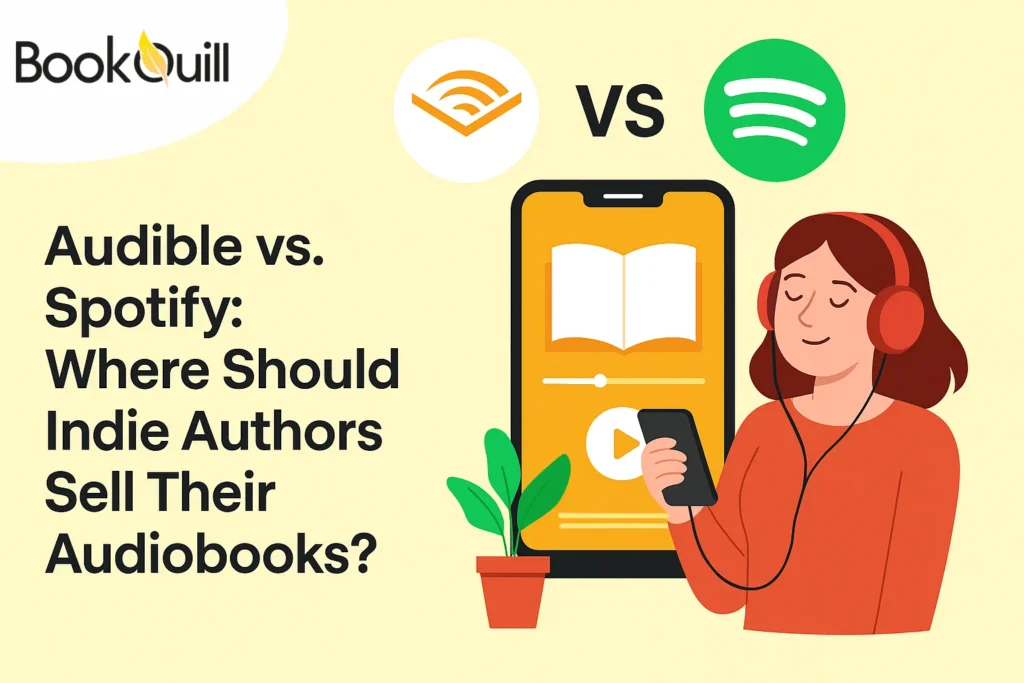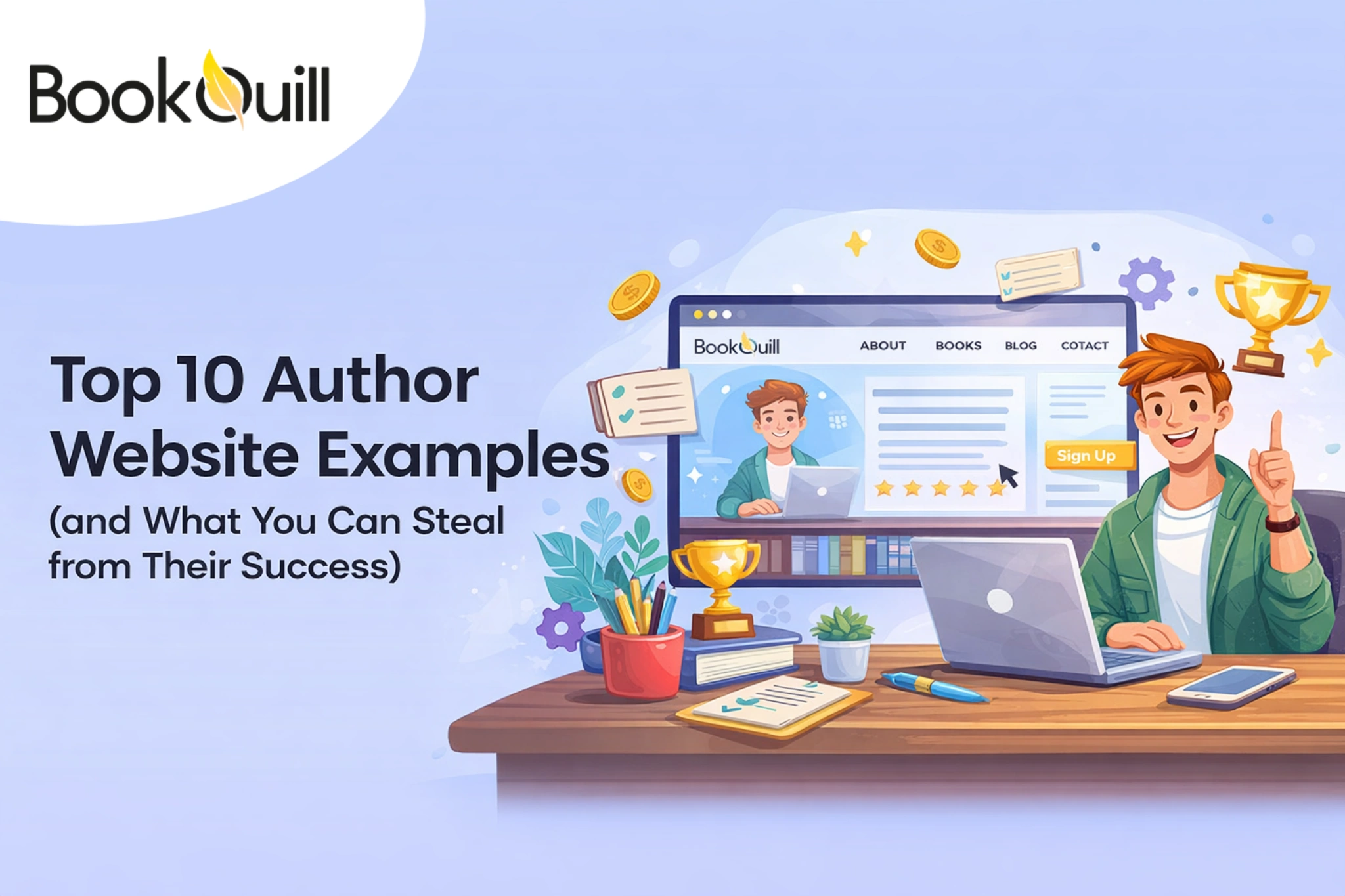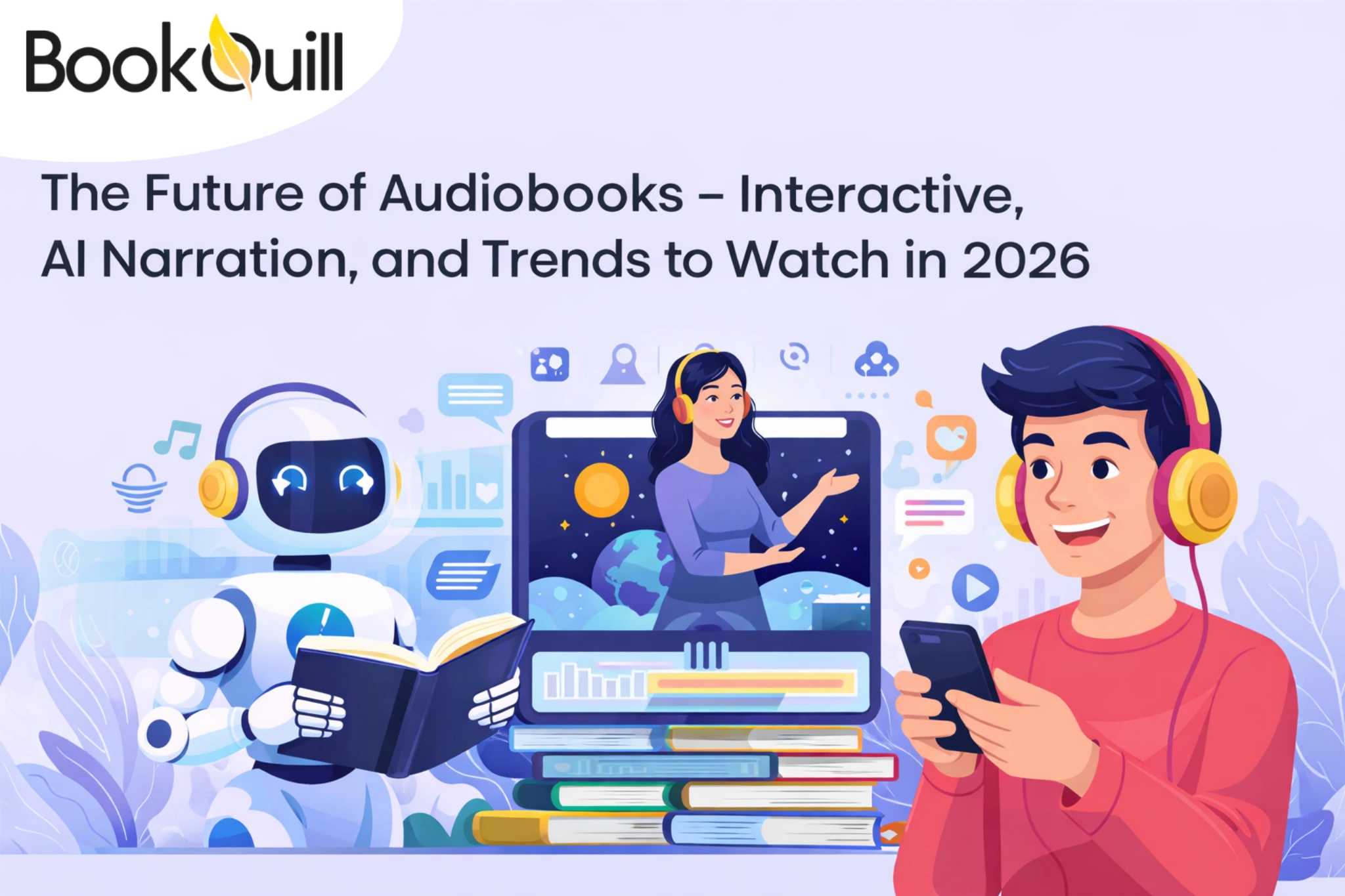Table of Contents
Explore Blogs
Trending on Ebook
Audible vs. Spotify: Where Should Indie Authors Sell Their Audiobooks?

You’ve finally wrapped your audiobook. Now comes the question that every indie author runs into: Audible vs. Spotify, where should you actually sell your audiobook?
Audible has been the go-to spot for years. It’s powered by Amazon, has millions of listeners, and seems like the obvious first choice. But lately, Spotify has jumped into the audiobook game, and it’s making waves. It has 696 million monthly active users, with 276 million paying subscribers. That’s a massive potential audience you might tap into.
But here’s the catch: These platforms are very different behind the scenes. We’re talking royalties, exclusivity, discoverability, and even how many hoops you’ll need to jump through just to get listed.
So, let’s break down Audible vs audiobooks on other platforms, side by side, so you can choose what truly fits your audience and your goals.
Key Takeaways
- Audible sells audiobooks with credits; Spotify streams them for Premium users.
- Audible pays per sale; Spotify pays per minute listened.
- Audible gives 40% (exclusive) or 25% (non-exclusive); Spotify pays less but can scale.
- Audible pays after 60 days; Spotify pays in 30–45 days.
- Audible limits control; Spotify offers more freedom.
- Audible has better book search; Spotify uses playlists and algorithms.
- Audible is great for serious listeners; Spotify suits casual listeners.
- A hybrid strategy (Audible + wide via Findaway) works well for many authors.
The Basics: What Are You Actually Comparing?
Before you decide where to sell your audiobook, let’s make sure we’re comparing the right things. Audible vs. Spotify isn’t just a question of “who has more listeners.” It’s a full-on platform face-off, and they operate in completely different ways.
What’s Audible?
Audible is owned by Amazon and has been around since 1995. It’s the OG of audiobooks, offering a huge library of:
- Fiction
- Nonfiction
- Podcasts
- Exclusive content
Most listeners pay monthly and use credits to “buy” audiobooks. Once downloaded, the audiobook is theirs to keep.
Audible’s audience is full of dedicated book lovers. That means people browsing here are intentionally looking for long-form content, which is great if you’re an author who wants serious listeners.
What’s Spotify?
Spotify started with music and podcasts. In 2023, they made a bold move into the audiobook world. Now, Premium subscribers get 15 hours of audiobook listening each month at no extra cost.
Unlike Audible, Spotify doesn’t sell audiobooks individually. It works on a streaming model, similar to how music royalties are paid out. That changes how you earn (we’ll talk about that soon).
Audible vs. Spotify: How Much Money Do Indie Authors Really Make on Each?
We know that creating a strong audiobook takes serious time, money, and effort. So, of course, you want to know: which platform is really going to pay you better?
Audible’s Royalty Setup
Audible pays based on a fixed percentage of the retail price. However, it also depends on whether you choose exclusive or not.
- Exclusivity with Audible (via ACX) = 40% royalties
- Wide distribution (non-exclusive) = 25% royalties
Sounds fair enough, right? Well, here’s a twist. You don’t control your own price; Audible sets it for you. You might feel your audiobook deserves $15, but if Audible lists it at $5.95, that’s the amount you’ll be paid for.
For example, if your audiobook is priced at $9.95:
- Exclusive = You earn $3.98
- Non-exclusive = You earn $2.49
And remember, listeners usually use credits, not cash, so sales volume might look different than what you expect.
Spotify’s Streaming Model
Spotify doesn’t “sell” your book. Instead, it pays per stream. But you can’t upload directly. Most indie authors go through Findaway Voices (now owned by Spotify), which distributes your audiobook to Spotify and other platforms like Apple Books, Chirp, and Kobo.
With Spotify:
- You earn a few cents per minute listened, not per “sale”
- Payouts go through Findaway, which keeps 20% of your revenue
- The more people listen, the more you earn
For example:
If a listener finishes a 6-hour book on Spotify, you might earn around $1.20 to $2.00, depending on how Findaway splits it. Not much, right? But over time, streaming can add up.
What About Payment Timing?
Now that we’ve covered how each platform pays, let’s talk about when you’ll actually see that money hit your account.
- Audible: Pays monthly, but with a 60-day delay after the month ends.
- Spotify (via Findaway): Pays monthly, usually with a 30–45 day delay.
So yes, neither is instant. But Spotify might get you paid just a little faster!
Which Platform Gives You More Control Over Your Work?
Now let’s talk control. Because if you’re an indie author, you probably want to decide what happens to your audiobook. This is where things get really different in the Audible vs. Spotify debate.
Audible: More Rules, Less Freedom
Audible distributes through ACX (Audiobook Creation Exchange), and it’s kind of like signing a contract with a record label. If you choose their exclusive deal, you give them total control for 7 years. Yes, you read it right, seven!
During that time, you:
- Can’t list your audiobook on Spotify, Apple, or anywhere else
- Can’t set your own price
- Must stay locked into Amazon, Audible, and iTunes only
Even if you go non-exclusive, you still have little pricing power, and leaving isn’t a quick process. Not exactly flexible.
Spotify (via Findaway): More Freedom to Move
With Spotify, you can upload your audiobook through Findaway Voices (a platform designed for authors and publishers) and distribute it anywhere they want. That means:
- No exclusivity required
- You keep pricing flexibility on other platforms (though not Spotify)
- You can distribute to 40+ retailers and libraries
You can even remove your book from platforms at any time with no penalties (just follow their removal timeline). That’s a big deal if you’re testing the waters. Findaway also gives you the power to control:
- Metadata (your book’s keywords and categories)
- Narrator credits
- Promo codes and review copies
If you’re working with audiobook creation services online, they’ll often help manage this backend so you don’t get buried in tech headaches.
What’s Our Take?
- Spotify gives indie authors more breathing room, especially if you’re just starting out.
- Audible might feel more “official,” but it’s not as flexible, especially when you’re trying to grow across multiple platforms.
Which Platform Gets You Noticed? Comparing Discoverability on Audible vs. Spotify
Creating an audiobook is only half the battle. If nobody finds it, you’re just whispering into the void. So, how do readers (or listeners) actually discover new audiobooks on each platform?
Audible’s Search Is Built for Books
Since Audible is built entirely around audiobooks, it makes sense that its search engine works like a bookstore.
- Categories are clear
- Filters like “length,” “language,” and “narrator” help narrow things down
- Bestseller lists, “Also Bought” suggestions, and curated picks help books get found
If you already have fans on Amazon, your Audible page can link up with your ebook or print edition, making it super easy for readers to buy the audio version.
But here’s the downside: competition is steep. With over 200,000+ audiobooks already available on Audible, getting noticed takes effort or serious marketing.
Spotify: A Music Platform Learning to Handle Books
Spotify isn’t built for books, yet. But it’s trying.
It recently launched a dedicated audiobooks section inside the app, available to Premium users only. According to Spotify’s Q1 2024 report, it now has over 600 million users, and audiobooks are becoming part of their listening habits.
What’s working well:
- Playlists of trending titles by genre
- Curated lists like “Top Romance Audiobooks” or “Most Popular Thrillers”
- Easy switching between music, podcasts, and audiobooks
Still, finding audiobooks on Spotify can feel a bit clunky, especially if listeners don’t know what they’re looking for. That said, because Spotify’s algorithm is music-based, there’s a chance your audiobook could land in unexpected places (think: someone listens to a true crime podcast, then gets served your thriller audiobook).
Where’s It Easier to Be Found?
Audible gives you bookstore visibility, but Spotify offers organic exposure to people who didn’t even know they were looking for a book.
If you’re banking on readers searching for your genre, Audible wins.
If you’re open to serendipitous discovery and long-term growth? Spotify has potential, especially as more people start looking for the best audiobooks on Spotify while scrolling through playlists.
Marketing Tools and Listener Engagement
So, someone discovers your audiobook, awesome! But what happens next? How do you keep them interested? Can you encourage them to leave a review? Let’s take a look at the tools different platforms offer to help you connect with your audience.
Audible’s Author Tools: Helpful, But Limited
Audible authors (especially through ACX) can generate promo codes to offer free copies for reviews. That’s a huge plus when launching a new book. But beyond that?
- No real-time listener data
- No way to message or re-engage with listeners
- Reviews live on Amazon/Audible, but you can’t respond to them
Audible works fine if you’re okay with a “set it and forget it” model. But if you’re hoping to build relationships with your listeners, it’s kind of a one-way street.
Spotify: Better Engagement, But Still Growing
Spotify is better at building community. That’s just part of its DNA—artists, podcasters, and now authors can benefit from the same tools.
- Your audiobook can be added to Spotify playlists
- You can link it to your author podcast, if you have one
- Listeners can follow your author profile (if connected via Findaway)
Spotify also collects listener behavior data (how long someone listened, when they stopped, etc), though this info isn’t directly available to authors yet. Still, it opens the door for smarter marketing down the line. Since your audiobook is listed like a music track, people can share it on Instagram, X (previously Twitter), and even embed it on websites, which is huge for discoverability.
Behind-the-Scenes Help: Worth It?
If you’re not a fan of wrangling metadata and uploading files, you might want to partner with a team. The top audiobook creation services don’t just help you record—they also assist with:
- Distribution
- Marketing strategy
- Choosing the right platforms
- Launch planning
Some professional audiobook services even handle listing updates and platform requirements so you can focus on your next book. That alone might be worth the price if you’re trying to get things off the ground faster.
What About the Listening Experience?
Okay, we’ve talked money, marketing, and metadata, but what’s it actually like for your listener to hear your book on each platform? That matters more than people think. A clunky app or missing chapter could be the difference between a glowing review and a refund request.
Audible’s User Experience: Built for Book Lovers
Audible’s app is smooth, reliable, and loaded with book-specific features:
- Chapter navigation and bookmarks
- Sleep timer
- Adjustable playback speed
- Whispersync with Kindle (so readers can switch between ebook and audio)
Most importantly, once someone buys your book, it’s theirs to keep forever. No expiration. No hourly limits. So, if your ideal reader is someone who loves highlighting quotes and taking notes, they’re probably already loyal to Audible.
Spotify’s Experience: Still Catching Up
Spotify’s audiobook interface is newer and still evolving. Right now:
- Listeners get 15 free hours a month with Premium (source)
- Features like bookmarks and chapter skipping are available, but not as refined
- There’s no ownership—just streaming access
- Some users have complained about mid-book cutoff once their 15-hour limit hits
Still, it’s getting better. Spotify has already added genre filtering and a “continue listening” section for audiobooks.
Since people are already on the app for music and podcasts, slipping your story into their routine feels…natural. Someone might find your book while commuting, working out, or cooking dinner. Many listeners are finding the best audiobooks on Spotify, without the cost of buying them elsewhere.
The Hybrid Strategy Guide: A Safe Route for Audiobook Distribution
If you’re an indie author looking to expand your reach, the hybrid strategy could be a great option for you. Here’s how it works and how to make the most of it.
The hybrid strategy means you distribute your audiobook in two ways:
- Go wide on platforms like Spotify, Apple Books, Kobo, and more (using a service like Findaway Voices).
- Keep one major title exclusive on Audible.
By doing this, you’re able to test both routes and see which one brings in more listeners. You don’t have to commit to either going wide or staying exclusive. Many authors use services like Findaway Voices to distribute their audiobooks to a variety of platforms. If you prefer, you can also team up with trusted partners like BookBaby, who can help you distribute your audiobook across different sites while handling the logistics.
If you’re feeling overwhelmed or short on time, these professional audiobook services can take care of everything for you, allowing you to focus on creating your next book.
Here’s the Bottom Line
By now, you’ve seen just how different these two audiobook giants really are. So, when it comes to Audible vs. Spotify, which one should you choose?
Here’s a quick summary:
| Feature | Audible | Spotify |
|---|---|---|
| Ownership | Amazon | Independent |
| Payment | Credit-based purchase | Streaming access (Premium only) |
| Royalty Model | Per sale, Fixed %, based on exclusivity | Per-stream model via Findaway Voices |
| Royalty Payout (2025 update) | 40% (exclusive) | Per stream (~$0.003–$0.005/min) |
| Discoverability | Book-focused searches | Algorithm-based content and playlists |
| Control | Limited (especially with exclusivity) | Flexible via Findaway Voices |
| Listener Type | Intentional audiobook buyers | Casual listeners & podcast fans |
| Best Use Case | Established reader audience | Music/podcast-first audience |
| Tools | ACX, promo codes | Findaway, playlist discoverability |
If you’re hoping for predictable income, Amazon’s reach, and loyal audiobook fans, Audible is the safer bet. It’s a mature platform with polished tools and buyer intent. But if you want long-term growth, flexibility, and access to millions of casual listeners, Spotify may surprise you. So, the real answer? Choose the platform (or platforms) that align with your goals right now, and permit yourself to pivot as you grow!
Frequently Asked Questions
Can I list my audiobook on Spotify and still sell it on Audible?
Yes, but only if you don’t sign an exclusive contract with Audible through ACX. If you go non-exclusive, you’re free to distribute your audiobook to other platforms like Spotify, Apple Books, Kobo, and more using services like Findaway Voices or the best audiobook creation services.
How do I get my audiobook on Spotify if I’m not a tech person?
You don’t need to be tech-savvy! Just use a distributor like Findaway Voices or partner with affordable audiobook creation services that offer distribution support. They’ll handle the upload, metadata, and platform placement for you, so you can focus on writing or marketing instead of learning new software.
What are some real Audible competitors besides Spotify?
Besides Spotify, indie authors are seeing traction on platforms like:
- Google Play Books
- Kobo Audiobooks
- Chirp (popular for limited-time discounts)
- Scribd (subscription model with unlimited listening)
Trying a mix of platforms helps you reach more listeners and keeps your income safer if one platform changes.
Are there genres that do better on Spotify than Audible?
Yes. Genres like romance, thrillers, self-help, and memoirs often do well on Spotify. Many people listen while driving, exercising, or cooking, so shorter and engaging books get more attention. If you write self-help or short stories, Spotify can help you reach listeners who might not check Audible.
What’s the benefit of taking professional help instead of DIY?
DIY can be fun, but tricky. However, professional audiobook services offer:
- Voice actor casting
- Studio-quality recording
- Editing/mastering
- Distribution setup
- Compliance with platform requirements
This ensures your audiobook sounds as good as the ones produced by big publishers.
Note: Some links in this post are affiliate links. If you buy through them, we may earn a small commission, at no extra cost to you. We only suggest tools we trust and find useful. Thanks for your support!
About Author
Hi My name is Micheal Adams, When I am not watching horror movies and helping my kids with homework or reading my favorite fantasy/supernatural novels – I’m writing to guide aspiring authors. I focus on exploring and simplifying both the technical aspects and the often-overlooked details of book writing and publishing so I can empower new writers to climb the Amazon bestseller list and connect with more readers




